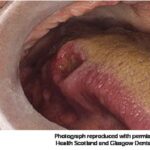Sudden excessive drooling in dogs can be alarming. While some drooling is normal, a sudden change can indicate an underlying issue. This article explores the common causes of sudden drooling in dogs and when to seek veterinary attention.
Common Causes of Sudden Drooling in Dogs
Several factors can contribute to a sudden increase in drooling, also known as ptyalism, in dogs. These include:
Oral Foreign Bodies
A foreign object lodged in your dog’s mouth or throat can trigger excessive drooling. The object might be a stick, bone fragment, or even a piece of fabric. Accompanying symptoms might include pawing at the mouth, difficulty swallowing, and gagging.
Dental Issues
Dental problems like gum disease, tooth abscesses, or broken teeth can cause significant discomfort and lead to increased drooling. Bad breath, difficulty eating, and pawing at the mouth are other potential signs of dental disease.
Nausea and Vomiting
Drooling can be a precursor to vomiting. Nausea in dogs can be caused by various factors, including dietary indiscretion, ingestion of toxins, or gastrointestinal upset.
Exposure to Toxins
Certain toxins, such as insecticides, household cleaners, and some plants, can cause excessive salivation. If you suspect your dog has ingested something toxic, contact your veterinarian or animal poison control immediately.
Heatstroke
Heatstroke is a life-threatening condition that can cause excessive drooling, heavy panting, lethargy, and collapse. Dogs are particularly susceptible to heatstroke in hot, humid weather.
Anxiety and Stress
Stressful situations, such as car rides, vet visits, or loud noises, can trigger increased drooling in some dogs. This is often accompanied by other signs of anxiety, like pacing, panting, and whining.
Neurological Disorders
In rare cases, sudden drooling can be a symptom of a neurological disorder affecting the nerves that control salivation.
When to Seek Veterinary Attention
While occasional drooling is normal, you should consult a veterinarian if:
- Drooling is sudden and excessive.
- Drooling is accompanied by other symptoms like vomiting, lethargy, difficulty breathing, or behavioral changes.
- You suspect your dog has ingested a toxin.
- Your dog is exhibiting signs of oral pain or discomfort.
- Drooling persists for more than a few hours.
Conclusion
Sudden drooling in dogs can have various causes, ranging from mild to life-threatening. Prompt veterinary attention is crucial if you notice a sudden increase in drooling or if it’s accompanied by other concerning symptoms. Early diagnosis and treatment can significantly improve your dog’s outcome.
Sources and References
- Kook, P. H. (2013). Ptyalism in dogs and cats-a short review.
- Baker, M. A. (1984). Thermoregulatory responses to exercise in dehydrated dogs. Journal of Applied Physiology, 56(3), 635-640.

